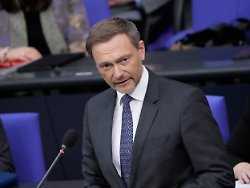Oil and gas production in the North Sea
Lindner rejects “fuel price brake” and limited speed limit
3/13/2022 3:32 am
The prices at the petrol stations continue to rise, but Federal Minister of Finance Lindner speaks out against the so-called fuel price brake. According to the FDP leader, this would not be possible without new debts. He also proposes a review of the coalition agreement over drilling in the North Sea.
Despite record prices at gas stations, Federal Finance Minister Christian Lindner continues to reject a temporary reduction in VAT from 19 to 7 percent for petrol and diesel. “If the Union calls for a so-called fuel price brake, then they have to say what they want to cut in the budget,” said the FDP politician to the “Tagesspiegel”. “Or they have to admit that they are willing to take on new debts.”
Contrary to the assumption of many, the Treasury will not get rich from the rising fuel prices, said Lindner. “If a higher proportion of a household’s disposable income is spent on fuel, there will be a shift in VAT, but not an increase in revenue. People then hold back on consumption elsewhere.”
Lindner also rejected a temporary speed limit as a measure to reduce fuel consumption. “In view of the high fuel prices, there is a natural impulse to consume less,” said the Finance Minister, pointing out that drivers could also take their foot off the accelerator pedal. “We have a war in Europe that not only causes human suffering, but also massive supply risks. I have to leave the symbolic debates to others.”
“Review the country’s entire energy strategy”
Lindner spoke out against a general ban on imports of Russian gas and oil. “Our concern must be to build up maximum pressure on Russia and at the same time possibly maintain our strategic staying power for a very long time. That’s why we shouldn’t question the energy supply unnecessarily,” stressed the finance minister.
In order to reduce dependence on Russian energy imports, Lindner proposed a review of the coalition agreement. So far, this has provided for a ban on new oil and gas drilling in the North and Baltic Seas. “We have to question the coalition agreement’s decision not to continue mining oil and gas in the North Sea,” said the FDP leader. “Due to the development of world market prices, this seems to be becoming more economical.”
Germany will still need oil and gas, at least for a transitional period. “In view of the changed geopolitical background, I think it’s advisable to examine our country’s entire energy strategy without any bans on thinking,” he appealed to the Greens to open themselves to expanding domestic oil and gas production and to support new drilling permits.
